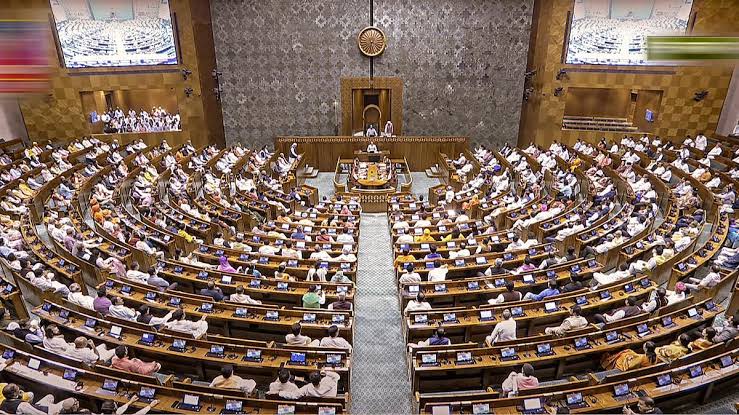Women’s Reservation Bill introduced during special Parliament Session

Women's Reservation Bill introduced during special Parliament Session ; Pune Pulse
By: Pune Pulse
September 19, 2023
Pune: The Women’s Reservation Bill, which aims to provide a 33% reservation for women in the Lok Sabha and state assemblies, was introduced in the Lok Sabha during the ongoing special session of Parliament.
Reservation for women will not be implemented in the 2024 Lok Sabha poll; it can come into effect only after a delimitation based on a census is conducted after the Bill has been passed as the next delimitation may be held in 2026.
Prime Minister Narendra Modi referred to September 19 as a “historic day” and urged the Opposition to unanimously pass the Bill, known as the ‘Nari Shakti Vandan Adhiniyam’, which has been pending for almost three decades.
During the Lok Sabha session, Prime Minister Modi stated that the first proceeding of the House in the new Parliament building marks the beginning of all parliamentarians opening gateways for women’s power with this crucial decision.
He announced that his government is bringing an important constitutional amendment bill, taking forward their resolve of women-led development. The ‘Nari Shakti Vandan Adhiniyam’ will further empower democracy, he added. The Prime Minister appealed to lawmakers to support the bill, stating that there have been many debates in the past regarding women’s reservation.
Law Minister Arjun Ram Meghwal presented the bill to lawmakers and once approved, the number of women MPs in Lok Sabha will increase from the current 82 to 181. Women account for almost half of the country’s 950 million registered voters but make up only 15% of parliament and about 10% of state legislatures.
Congress leader Adhir Ranjan Chowdhury credited his party for the women’s quota bill, stating that former Congress governments under Rajiv Gandhi, PV Narasimha Rao, and Manmohan Singh had consistently tried to pass the bill to provide reservation for women. Chowdhury also claimed that the Women’s Reservation Bill, which was passed in the Rajya Sabha during the Congress regime under Manmohan Singh, is still pending.
The Constitution (One Hundred and Twenty-Eighth Amendment) Bill, 2023, aims to introduce three new articles and one new clause in the Constitution. The first proposed amendment is a new clause in 239AA, which mandates the reservation of seats for women in the Delhi Legislative Assembly.
Specifically, one-third of the seats reserved for Scheduled Castes (SCs) shall be reserved for women, and one-third of the total number of seats to be filled by direct elections shall be reserved for women through a law determined by parliament. The second proposed amendment is a new Article – 330A, which provides for the reservation of seats for women in the Lok Sabha. Under this amendment, one-third of the seats reserved for SCs and Scheduled Tribes (STs) shall be reserved for women, and one-third of the total seats to be filled by direct elections to the Lok Sabha shall be reserved for women.
The third proposed amendment is a new Article – 332A, which mandates the reservation of seats for women in every state Legislative Assembly. One-third of the seats reserved for SCs and STs shall be reserved for women, and one-third of the total seats to be filled by direct elections to the Legislative Assembly shall be reserved for women. The fourth proposed amendment is a new Article – 334A, which stipulates that the reservation shall come into effect after the delimitation is undertaken after the relevant figures for the first census have been published.
Rotation of seats for women shall take effect after each subsequent exercise of delimitation. It is noteworthy that a bill to provide reservation for women in Parliament and assemblies was first introduced in the Lok Sabha in 1996 by the Deve Gowda-led United Front government. However, it failed to receive the approval of the House and was referred to a joint parliamentary committee, which submitted its report to the Lok Sabha in December 1996. Unfortunately, the Bill lapsed with the dissolution of the Lok Sabha.
In 1998, the Atal Bihari Vajpayee-led NDA government reintroduced the Bill in Lok Sabha. However, this bill also failed to garner support and lapsed again. The bill was reintroduced in 1999, 2002, and 2003. Despite having support from the Congress, the BJP, and the Left parties, the bill failed to receive a majority of votes.












